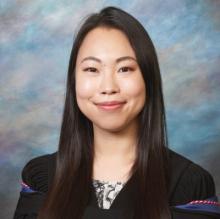Chihori Tsukura
What are your main responsibilities or activities in your current position?
I have been working as an occupational therapist at Community Health Services. I support those in the community to complete their “occupations” - activities that are important and meaningful for them. At Community Health Services, the occupations that we focus on are mostly personal care tasks (e.g. showering) or household tasks (e.g. housecleaning, grocery shopping). We visit clients' homes to explore their goals and assess their function in their own environment. To enable clients to complete their occupations, we often discuss strategies or recommend equipment, including mobility equipment such as wheelchairs. Home support services may be set up if this appeared to benefit clients and their families. Also, we value fall prevention, in order to ensure clients can stay and complete their occupations safely at their home.
How does your current work relate to your graduate degree?
The Master of Occupational Therapy (MOT) program has provided us with a ticket to write the National Occupational Therapy Certification Exam and prepared us to become a “generalist” as a new grad occupational therapist. The key thing I have learned through the UBC MOT program is that occupational therapists should see things through multi-layered lenses - from the personal level to the institutional or the sociocultural level. This key to see things from the macro-level encouraged me to be more curious about my clients, get to know them better, and see the situations/matters through their eyes.
What do you like and what do you find challenging about your current position?
As I work in the community, the home is the environment that is personalized to each client’s life and out of my control and anticipations. Other factors - such as clients’ own values and interests, their families, socioeconomic status, etc. - come into play. As a new grad, I struggled at the beginning to apply/adapt my learning flexibly as there is less “routine work.” However, after working for about a year, I find it very interesting to work with my clients in the community as every person’s situation is unique, and it is very rewarding when client and I work together to figure things out so that they can complete what they want/need to do in a meaningful way.
What motivated you to pursue graduate work at UBC?
When I decided to pursue my career in occupational therapy, I had gotten to know that the UBC MOT program offers the most number of the field placements among the OT programs in Canada (that I was able to apply for as an international student). I appreciated that the program offers this opportunity for student occupational therapists to have intensive practical experiences in 5 different clinical fields, as I found this helpful to appreciate the depth of this career and explore my interests and passions.
What is your best piece of advice for current graduate students preparing for their future careers?
Be curious, and when you find an opportunity - an opportunity to learn, an opportunity to enjoy your day - just give it a try for every opportunity! I recognize that I devoted the most of my time for studying, and (although that is what I, at that time, probably needed) I wish I have enjoyed my time more as a person! Explore what occupations are important to you, and don’t devalue those occupations that you find meaningful and fulfilling your energy. Take your time to do self-care, before anyone else, so that you can take care of others :)

